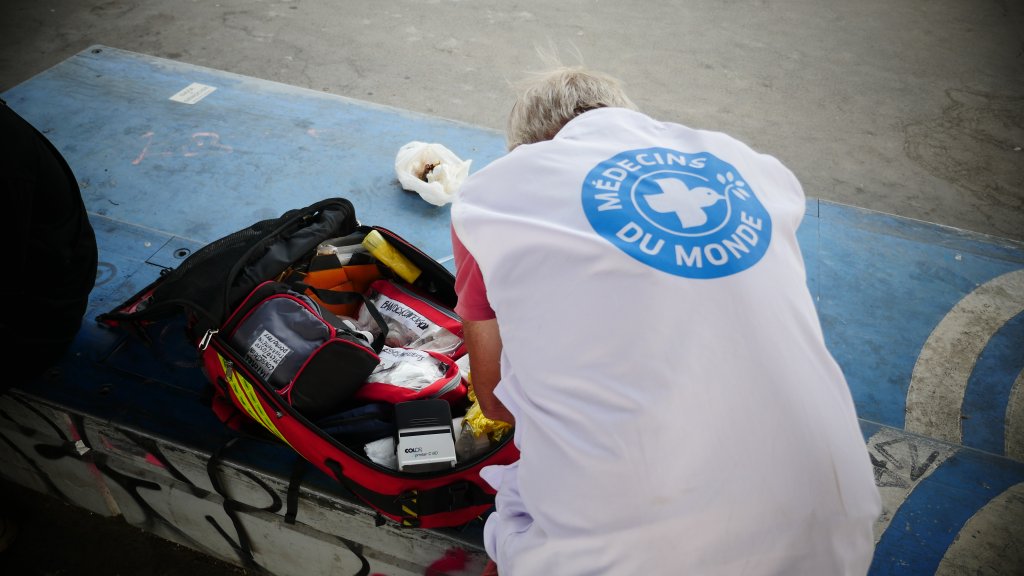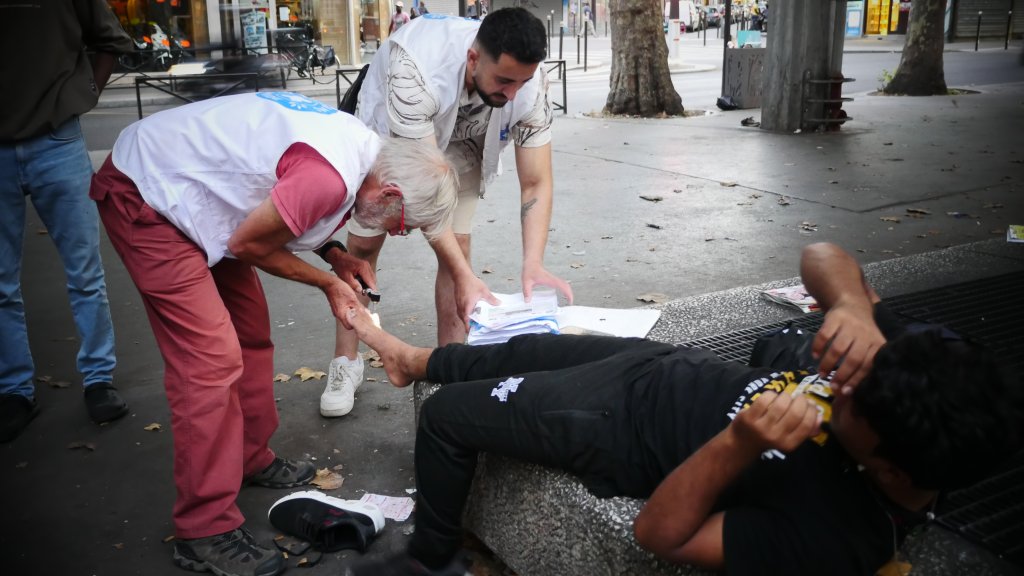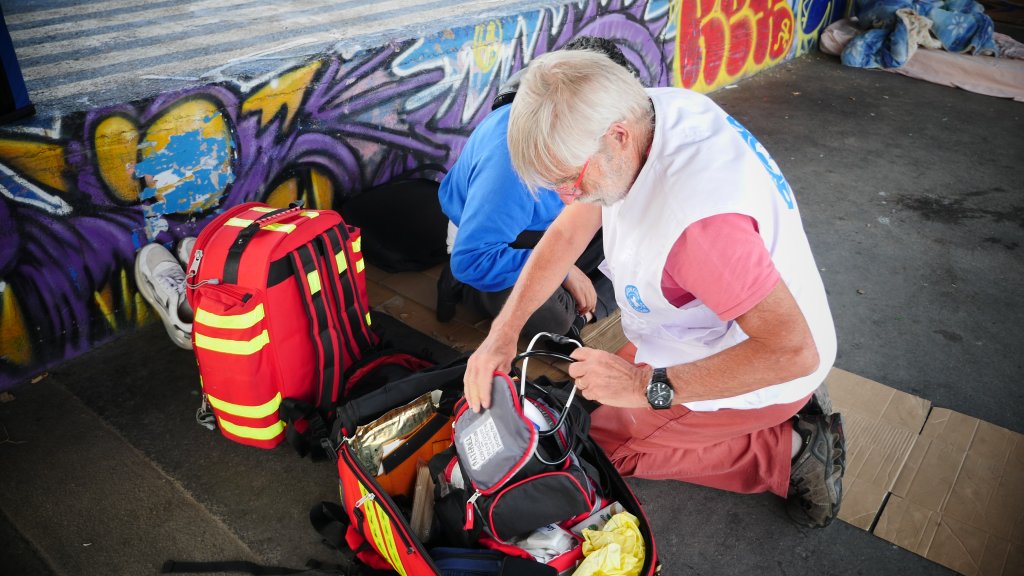Médecins du Monde has been organizing aid patrols to provide care for migrants still living on the streets, despite police dismantling multiple camps and relocating people outside Paris ahead of the Olympics. InfoMigrants followed one such patrol.
Beneath the Paris metro line 2, in the north of the capital, piles of cardboard lie scattered around a few mattresses. Only a few people remain.
"Sometimes we get to camp sites where there were hundreds of people a few weeks ago, and we no longer find anyone," Matthias Bingham, a field worker for Médecins du Monde (MdM), told InfoMigrants.
For several weeks, and with the approach of the Olympics, Médecins du Monde (MdM) has been reaching out to the most isolated migrants through regular patrols.
Previously, the medical NGO operated with a mobile truck or through its clinics. "But with the Olympics, we had to adapt our approach," Matthias Bingham explained. "Because of the Olympic police measures, the people who remain are hiding, taking refuge in remote places, and, for example, pitching their tents between bushes," he added.
Wearing white vests with the NGO’s recognizable logo and carrying medical backpacks, MdM teams walk the streets of the capital from Tuesday to Friday, from 7 to 10 pm. The teams include a doctor and interpreters. However, despite this new healthcare initiative, finding patients since the start of the Olympic Games has sometimes been a challenge. "Here is one of the only places that seems spared by the social cleansing," Matthias Bingham commented, facing the skatepark near the Stalingrad metro station.
Also read: Paris police evict hundreds of migrants ahead of Olympics

'There’s no chance the 115 emergency shelter hotline will help'
Lying on a mattress behind an obstacle in the skatepark, Rahmatullah, a 25-year-old Afghan, has pain in his foot. After examining him, Alain Bene, the team doctor, provides the young refugee, who has been in France for four years, with a cream and a prescription for an X-ray.
Recognizing the gear of Médecins du Monde, Mostapha approaches with a crutch and a freezing bag containing his thick medical file. This undocumented Algerian was the victim of an assault last May, "a hammer blow to the head," he says. After surgery, he still suffers and is desperately seeking shelter. "As a single man right now, unfortunately, there’s no chance the 115 emergency shelter hotline will help. There are 8,000 calls a day and not enough spots," Matthias Bingham tells him.
A little further under the metro, where over 300 people were still living last May, Yonas, a young Eritrean who arrived in France four months ago, approaches the doctor to discuss his dental problems. He has a cavity and the doctor refers him to the appropriate clinic. But he also complains about his living conditions here. Since the camp was dismantled, the "no fixation" policy has been in full effect. The young man sleeps on the ground, without a tent or mattress, and becomes animated when talking about the police. "Every morning without exception, they come and evict us. But we have absolutely nowhere to go, so we move a few streets down and come back. And we do it again the next day," he says.
Also read: Paris: Migrants evicted to make way for Olympic Village
Guidance
Kamran, a 21-year-old from Afghanistan, arrived in France just a few hours ago. The young man is trying to find his bearings and gradually discovers the daily life that awaits him. "I’m looking for Afghans," he says in Pashto before calling the doctor for his foot. Immediately, Alain grabs a flashlight and examines him. He diagnoses "athlete’s foot," a skin infection caused by a fungus. "It’s no surprise, given that this young man has been walking in this heat for days," the doctor says.
The young Afghan, freshly arrived in France after crossing the Franco-Swiss border, is finally directed to La Chorba for food distribution and a place where he can submit his asylum application. Lost in the middle of this bustling avenue, he gives one last look and places his hand on his heart towards the humanitarian teams as a gesture of thanks.

Simply directing migrants to the appropriate structures can help them significantly. This was the case for a young Eritrean lying on a mattress with headphones on. He was referred to emergency medical services last week by Médecins du Monde for scabies but could not travel because he could not pay for transportation – the price of a train ticket increased to 4 euros during the Games. Today, he was able to see a doctor thanks to tickets distributed by the association, and the scabies is gradually healing.
"We treat everything from minor injuries to scabies," Matthias Bingham said. He helped "about fifteen people" that evening.
Also read: 'Social cleansing': NGOs blast pre-Olympic migrant evictions
'The forgotten of the party'
Before the competition, camp evictions multiplied, and associations lambasted authorities for "social cleansing." In three months, authorities dismantled 42 migrant camps in Paris and its regions, resulting in the expulsion of 2,572 people from their informal living spaces. This is more than the total number of operations carried out in 2023 -- 29 camps were evacuated then.

The expelled individuals were sent to "regional holding centers" or temporary sites. Hundreds of unaccompanied minors are in gymnasiums in the Paris region. "Social cleansing has taken place and is effective. There are people we used to see regularly that we don’t see at all anymore, which means access to care is significantly reduced," Matthias Bingham told InfoMigrants.
Well before the Olympics, associations warned of the consequences of the Games for migrants, the "forgotten of the party." The Revers de la Médaille collective conducted a poster campaign on the walls of the capital. In Stalingrad, part of the posters denouncing "the security response against people on the streets" on the sidelines of the Games was covered by a mural of the Olympic basketball team.
Also read: France: Sick without papers
